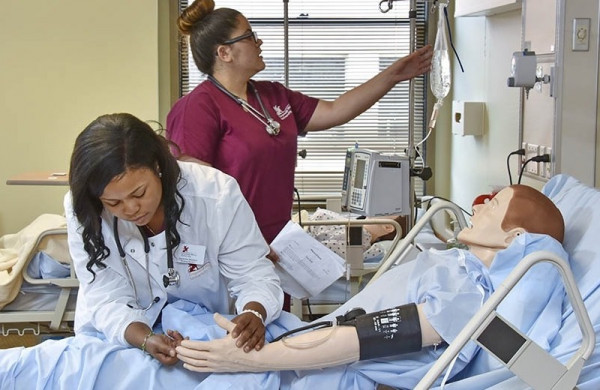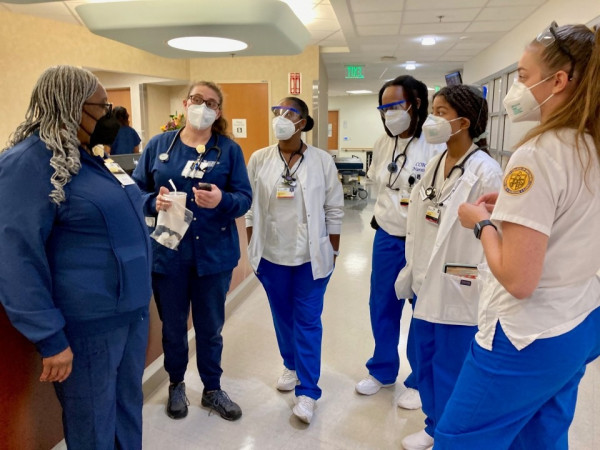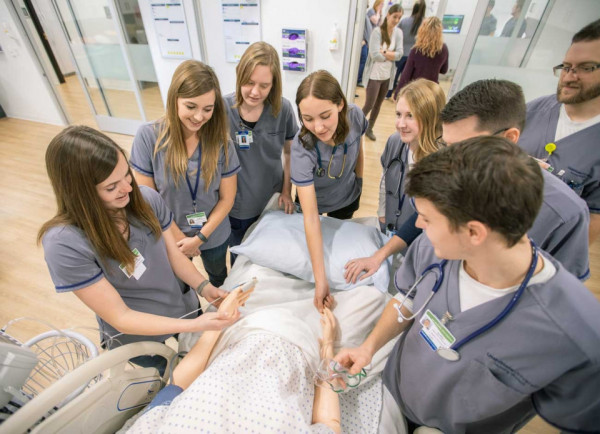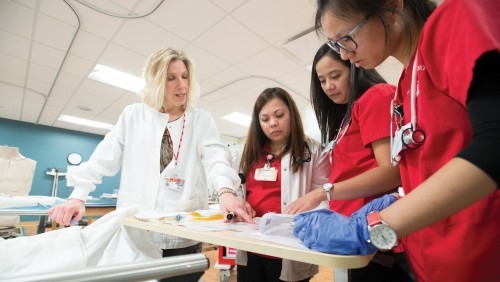
University of Bolton, Deane Road, Bolton. BL3 5AB
Tel:
Email:


“At the University of Bolton, we take great pride in providing a quality, supportive learning environment for our students.”
Professor George E Holmes DL | President & Vice Chancellor
“...tutors are very supportive and you’re not just a student ID number, at this university you are an individual with a name.”
Ellisse Vernon | BSc (Hons) Adult Nursing
Back to menu
Back to menu
Study with an Off-Campus Partner
Back to menu
Back to menu
University of Bolton, why we are the right choice
Location - Bolton, Greater Manchester

05/07/2023
Nurses of different educational levels and backgrounds are in need now more than ever. With the population ageing and getting sicker, there is a notable urgent demand for people with nursing degrees.
Often known as frontline warriors, nurses are the eminent pillars of the healthcare system. Whether it's tending to the sick, comforting the weary or saving lives in the face of adversity, nurses are the unsung heroes of healthcare.
If you've ever felt the calling to join their ranks, this blog is your compass to navigate the path towards getting a nursing degree. From the first steps of a nursing degree to the challenges of practical experience, we'll unravel all secrets. We will unveil the opportunities that await you in the captivating world of caregiving. So, let's get started:
How to Become a Nurse?
 Have you ever felt the deep desire to be a guardian of health, a healer of hearts and a source of comfort for those in need? If so, you're about to embark on an extraordinary journey towards a nursing degree.
Have you ever felt the deep desire to be a guardian of health, a healer of hearts and a source of comfort for those in need? If so, you're about to embark on an extraordinary journey towards a nursing degree.
From education to professional practice, the path may seem daunting, but fear not! We will be your guiding light, illuminating the way towards your dreams. Here are the steps you need to follow to become a nurse:
Step One: Nursing Degree
It all begins with a solid foundation of knowledge and skills. Pursue a nursing degree from a reputable institution. Immerse yourself in anatomy, physiology, pharmacology and the art of patient care. The classroom will become your sanctuary and textbooks your trusted companions.
Step Two: Clinical Experience
Nursing degrees alone won't make you a competent nurse. You must venture into the realm of hands-on practice. Step into hospitals, clinics and community settings, where real-life scenarios will shape your skills. Embrace the opportunity to learn from seasoned nurses. Observe their expertise and master the art of compassionate care.
Step Three: Licence
Every nurse needs a licence to practise. Study and pass the Nursing & Midwifery Council or NMC UK exam. This may seem intimidating, but remember; it's a testament to your dedication and readiness to provide safe and competent care.
Step Four: Specialisation
Nursing degrees offer many specialisations, catering to diverse interests and passions. Choose your path, whether it's paediatrics, geriatrics, critical care or any other field that ignites your passion. Specialisation nursing degrees equip you with expertise, enabling you to make a profound impact in your chosen area of focus.
Step Five: Lifelong Learning
The pursuit of knowledge doesn't end with a nursing degree or licence. Embrace the ethos of lifelong learning. Stay abreast of the latest advancements, research and evidence-based practices. Attend workshops, conferences and get advanced nursing degrees to grow and evolve as a nurse.
How Many Years Does it Take to Get a Nursing Degree?
 Is your heart brimming with the desire to begin a nursing degree journey, but one burning question lingers: How many years does it take to get a nursing degree? Fear not, for we're here to shed light on the path that lies ahead.
Is your heart brimming with the desire to begin a nursing degree journey, but one burning question lingers: How many years does it take to get a nursing degree? Fear not, for we're here to shed light on the path that lies ahead.
The answer depends on the type of nursing degree you choose. For those aspiring to become a nurse, a nursing degree takes around three years to complete. These nursing degrees take you on a comprehensive educational trip. It equips you with the knowledge, skills and critical thinking skills to excel in this profession.
It's important to note that the duration of your nursing degree is not the sole determinant of your success as a nurse. The quality of the nursing degrees, clinical experiences and your dedication to learning and growth also play crucial roles in shaping your abilities and competencies.
How Can I Become a Nurse in the UK?

Dreaming of getting a nursing degree in the enchanting lands of the United Kingdom? Prepare to embark on a remarkable adventure that combines passion, dedication and a touch of British charm. But how can you make this dream a reality? Let us guide you the right way.
Education is key. Complete a nursing degree program approved by the Nursing and Midwifery Council (NMC). These nursing degrees will equip you with the necessary knowledge and skills to excel in the field.
After completing your nursing degree, you'll need to get registration with the NMC. This involves submitting an application, taking exams, proving your qualifications and going through background checks.
Practical experience is essential. Through clinical placements, you'll gain valuable hands-on experience. You will get the chance to work alongside experienced nurses in various healthcare settings. These placements will deepen your understanding and sharpen your skills.
Continuing professional development is crucial for growth in this profession. Embrace lifelong learning by attending workshops and conferences and pursuing advanced nursing degrees
Embrace the UK healthcare system. Familiarise yourself with the values, policies and standards of care within the National Health Service (NHS). Collaborate with multidisciplinary teams and embrace the diversity of patients and healthcare professionals.
How Much do Nurses Get Paid?
 Nurses' salaries in the UK vary based on experience, nursing degrees and location. As a recent graduate, you can expect to earn around £24,907 to £30,615 per year. This initial salary provides a solid foundation for your career.
Nurses' salaries in the UK vary based on experience, nursing degrees and location. As a recent graduate, you can expect to earn around £24,907 to £30,615 per year. This initial salary provides a solid foundation for your career.
With increased experience and advanced nursing degrees, your earning potential grows. After a few years, your salary can reach between £31,365 and £37,890 per year. This recognition of your expertise reflects the dedication you've invested in your journey.
For those aspiring to leadership roles like advanced nurse practitioners or nurse consultants, salaries can reach £38,890 and beyond. These positions reward specialised skills and contributions to healthcare. It's important to note that salaries can vary across regions. Major cities often offer higher salaries due to the higher cost of living, while rural areas may have lower ranges.
Can You be Paid to Train as a Nurse?
 In the realm of nursing degrees, there are opportunities where you can get paid while you train. One such opportunity is through the apprenticeship route. In the UK, aspiring nurses can enrol in a Nursing Degree Apprenticeship program.
In the realm of nursing degrees, there are opportunities where you can get paid while you train. One such opportunity is through the apprenticeship route. In the UK, aspiring nurses can enrol in a Nursing Degree Apprenticeship program.
This unique pathway allows you to study for your nursing degrees while working as a paid apprentice. Yes, you heard it right—earning a salary while gaining the knowledge and skills to become a nurse.
Through a Nursing Degree Apprenticeship, you'll combine academic study with practical experience. You will immerse yourself in the world of nurses while receiving a pay check. It's a win-win situation that empowers you to embark on your nursing degree journey without the burden of tuition fees that often comes with nursing degrees.
It offers not only financial benefits but also provides you with valuable hands-on experience from the start. Working alongside experienced nurses, you'll learn the intricacies of patient care. You will develop essential skills and build a solid foundation for your future nursing degree career.
Do You Need A-Levels to Train as a Nurse?
 Setting your heart on a nursing degree career but unsure if A Levels are necessary? Good news! A Levels are not the only path to becoming a nurse.
Setting your heart on a nursing degree career but unsure if A Levels are necessary? Good news! A Levels are not the only path to becoming a nurse.
While A Levels in subjects like Biology and Chemistry can be helpful, other routes exist. Access to Higher Education Diplomas caters to individuals without traditional qualifications like A Levels. These focused programs equip you with the knowledge and skills needed for this field.
Another option is Nursing Degree Apprenticeships. These apprenticeships offer practical experience alongside studying for nursing degrees. A Levels may not be mandatory for entry, but other requirements like GCSEs in English, Maths and Science are important.
Nursing degrees value diverse backgrounds, combining academic achievement with personal qualities. Don't let the absence of A Levels deter you. Explore different routes and showcase your dedication, compassion and desire to care for others.
Do NHS Student Nurses Get Paid?
 Dreaming of joining the esteemed ranks of NHS student nurses? Wondering if you'll be financially supported on your journey? Good news – NHS student nurses do receive payment!
Dreaming of joining the esteemed ranks of NHS student nurses? Wondering if you'll be financially supported on your journey? Good news – NHS student nurses do receive payment!
As an NHS student nurse, you'll receive a financial package to support yourself. This includes a bursary for tuition fees and a means-tested maintenance grant for living costs. No more worrying about student debt – you'll get support as you pursue your nursing degree passion.
But there's more! During clinical placements, you'll also receive a placement allowance. This recognizes your contribution to patient care and provides extra financial support. Investing in the future of healthcare professionals, the NHS ensures that aspiring nurses can focus on their studies and become the best they can be. Remember, specific payment structures may vary, so it's wise to check with the NHS or your educational institution for the latest information.
Conclusion:
The path to becoming a nurse is an extraordinary journey of compassion, dedication and personal growth. From rigorous education and training to rewarding experiences at the bedside, a nursing degree offers a world of opportunities to make a positive impact on the lives of others. Whether you choose to pursue traditional nursing degrees or explore alternative routes, the key is to follow your passion and never lose sight of your purpose.
If you're ready to take the first step towards this rewarding profession, consider exploring the nursing degrees offered at Bolton University. Here, you'll find a supportive and nurturing environment that will shape the next generation of nurses. With experienced faculty, state-of-the-art facilities and a commitment to practical learning, Bolton University provides exceptional nursing degrees that prepare you for the challenges and opportunities that lie ahead.
To learn more about Bolton University's courses, contact us at enquiries@bolton.ac.uk or call +44 1204 903142 to speak to a member of the team. Start your journey towards a rewarding career right away and experience #UniAsItShouldBe!